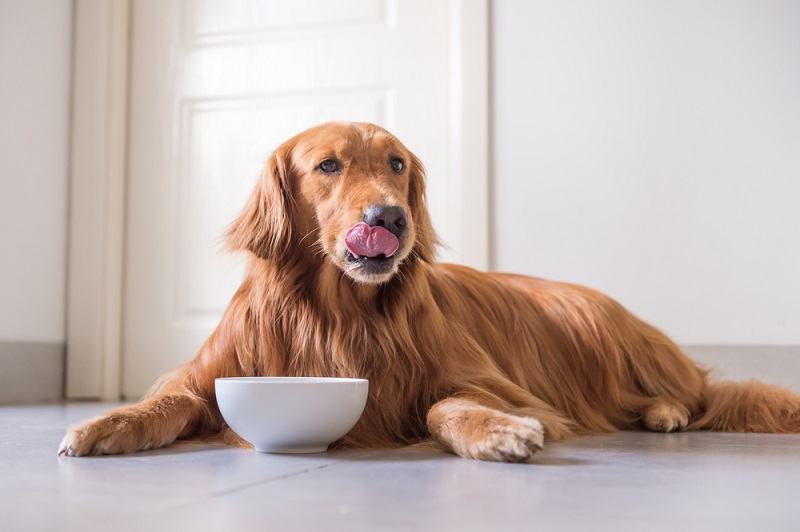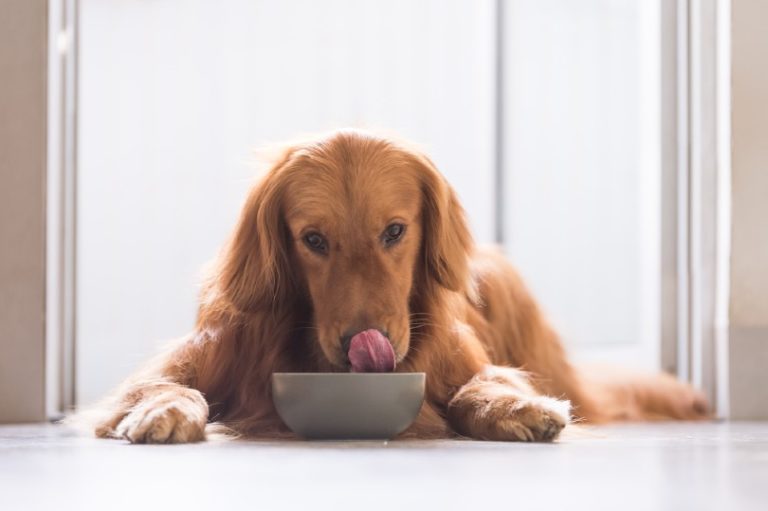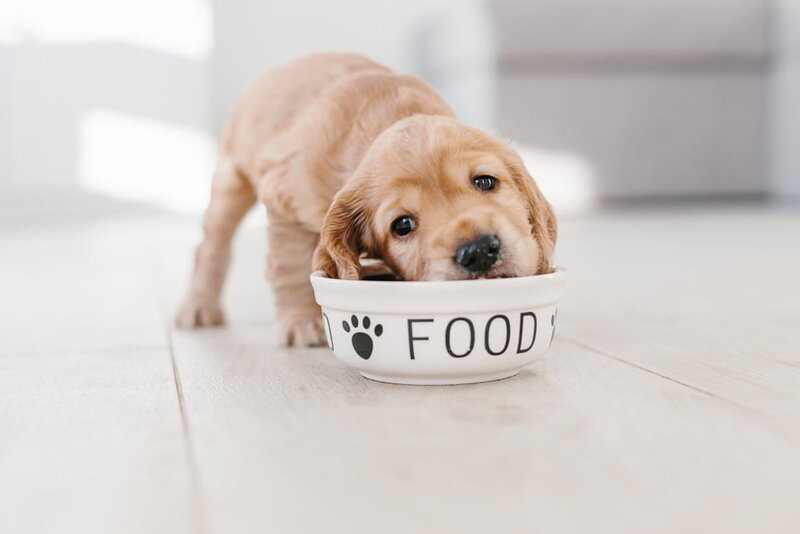Your golden retriever puppy’s nutritional requirements will alter as they develop into adulthood, but how can you figure out when he is ready to eat adult dog food? Discover when to switch golden retriever to adult food in this guide!

When To Switch Golden Retriever to Adult Food?
Golden retrievers, a large dog breed, can transition in approximately 15 months. Most golden retriever puppies tend to be transitioned between 12 and 15 months of age, depending on their activity levels.
Your veterinarian can advise you on the optimal time to begin feeding adult food based on your dog’s individual requirements. Obesity is the most prevalent nutritional issue for canines, and it can create orthopedic difficulties in older dogs, so adult dogs should no longer eat puppy food. Instead, provide your best friend with the best dog food for golden retrievers and high-quality cuisine designed for adult consumption.
How to Switch from Puppy to Adult Dog Food?

When you stop feeding golden retriever puppy food, you must adjust more than simply his diet. Meal frequency and quantity size will also change.
Most golden retriever puppies consume three meals every day, whereas adult dogs can eat only two. The feeding recommendation on your dog’s food label will instruct you how much to feed him every day and how to divide the amount into two servings.
When it comes time to switch golden retriever to adult food, take it gradually. A gradual transition minimizes stomach distress.
Here’s an example transitional feeding plan:
- Days 1–2: Feed 3/4 of the regular amount of puppy food plus 1/4 of adult dog food.
- Days 3–4: Feed 1/2 puppy and 1/2 adult dog food.
- Days 5-7: Feed 1/4 of puppy food with 3/4 of adult dog food.
- Days 8-10: Feed just adult dog food.
If your golden retriever refuses to eat the adult dog food or develops an upset stomach, lengthen the transition time if necessary. If you require additional assistance, contact your veterinarian.
Why Feed Your Golden Retriever Premium Food When Switching From Puppy To Adult Food?

You realize the importance of quality, hence you feed your golden retriever puppy a premium meal with balanced nutrition. What kind of food should you give them when they reach adulthood?
Feeding the best adult food will help them maintain the good nutrients they receive as puppies. Switching to a lower-quality product at this stage in your dog’s life, on the other hand, could disrupt their digestive tract and provide them with less nutritional value than they were raised with. Discover the best food for your adult golden retriever.
Read more >> Top 10 Best Dog Food For Golden Retrievers With Allergies
FAQs
Can golden retriever puppies take adult dog food?
Although a single serving of adult dog food will not damage a puppy, it cannot be nutritionally balanced and may cause a deficiency or health issues if consumed on a regular basis. It is critical to select a dog food specifically designed for puppies. Puppies have distinct dietary requirements than adult dogs; they require a higher concentration of specific nutrients for development and growth. Puppy food usually contains additional protein, fat, vitamins, and minerals to help their growing bodies.
To ensure that your puppy receives the proper nutritional balance, follow the feeding directions on the package.
How long to feed your golden retriever puppy food?
When to transfer your golden retriever from puppy to adult dog food depends on your puppy’s breed, size, and growth rate. Your puppy’s nutritional requirements change as he or she grows into adulthood. This is typically when you can switch to adult dog food.
To satisfy your puppy’s developing needs, “growth” feeds have greater protein and calorie counts. However, once your puppy is six to twelve months old, his needs shift.
Track your puppy’s weight, development, and overall health. Consult with your veterinarian if you observe your puppy acquiring too much weight or developing too fast.
What occurs if you transition your dog to adult food too early?
Transferring from puppy to grownup golden retriever dog food too soon might influence your dog’s well-being and growth. Puppy food is specifically designed to fulfill the nutritional demands of growing puppies, with greater levels of particular nutrients and minerals such as protein and fat to assist in their rapid development and growth.
If you switch to adult dog food too soon, your dog might not receive enough necessary nutrients for optimal growth and development.
Does puppy food promote diarrhea in older dogs?
Yes, serving puppy food to senior dogs may result in diarrhea or other digestive difficulties. Puppy food contains increased levels of specific nutrients, like protein and fat, to promote rapid development and growth.
Feeding golden retriever puppy food to senior dogs, particularly those with low activity levels, may overwhelm their systems with excessive nutrients, resulting in unhappy tummies and undesirable weight gain. We urge that you consult with your veterinarian before modifying your dog’s diet. If you want to adjust their diet, try these natural dog diets created exclusively for adult dogs.
Conclusion
Knowing these growth phases is beneficial for puppy owners. It lets them prepare for what they can anticipate as their puppy grows and offers them confidence that they are feeding them the proper food during their early years. Hope that the above guide helps you get a clear answer to the question “When to switch golden retriever to adult food?”

As a dedicated pet writer with a passion for Golden Retrievers, I’ve spent years studying and writing information to help owners give the finest care for their beautiful companions. While I do not personally own a Golden Retriever, my writing stems from a genuine love for the breed and a desire to provide useful, well-researched information. My goal is to provide practical and useful advice to Golden Retriever owners on topics such as food selection, common health conditions, and training strategies.

